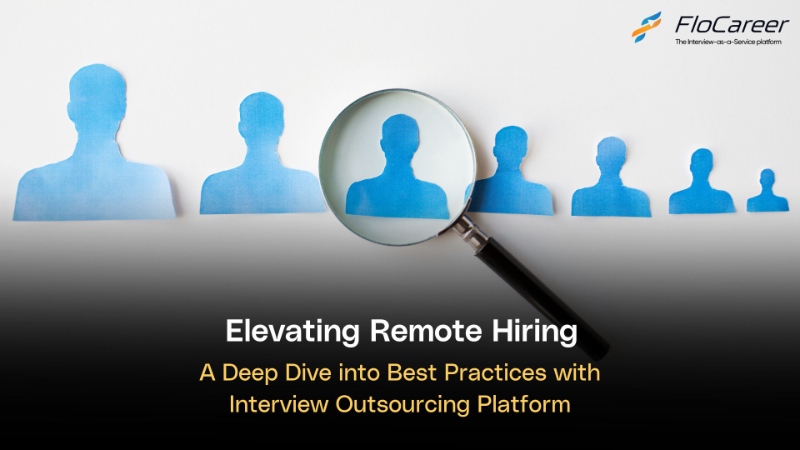Elevating Remote Hiring: A Deep Dive into Best Practices with Interview Outsourcing Platform.
In the rapidly evolving job market, remote hiring has emerged as a vital process for businesses seeking to attract top talent globally. Technological advancements have propelled video interviewing technologies to the forefront, serving as essential tools for hiring managers and recruiters. This post explores the advantages of remote hiring and delves into the best practices that can transform businesses into experts in utilizing video interviewing technologies to secure the finest candidates.

Read:Choose the Right Interview as a Service Platform for Your Company
Unlocking the Potential of Remote Hiring.
Remote hiring, synonymous with virtual hiring or telecommuting, involves recruiting and onboarding employees who work remotely rather than in a traditional office setup. This practice has gained momentum, allowing companies to access a global talent pool and construct diverse teams.
Remote hiring brings numerous advantages for both employers and candidates. Companies can cut costs related to office space, while candidates gain the flexibility to work from anywhere, eliminating the need for relocation. Millennials and Gen Z, valuing work-life balance and the freedom to design their work environment, find remote work particularly appealing.
Access to a larger talent pool stands out as a primary advantage of remote hiring. Geographical restrictions diminish, enabling businesses to recruit top talent globally. This fosters diversity, encouraging cross-cultural interactions and creating a more inclusive workplace.
Additionally, the cost savings from not maintaining physical office spaces empower companies to allocate resources to staff development, technological infrastructure, or expanding their product offerings. For candidates, remote hiring offers unparalleled flexibility, eliminating long commutes and allowing them to achieve a better work-life balance.
Despite these benefits, remote employment comes with unique challenges. Dispersed teams across time zones may face communication and collaboration hurdles. To mitigate these challenges, employers need efficient communication tools, addressing the potential loneliness or disconnection felt by remote workers.
Best Practices for Seamless Remote Hiring
Implementing remote hiring processes may pose challenges for businesses accustomed to traditional hiring methods. However, adhering to best practices can streamline these procedures and ensure successful integration of remote workers into teams.
Define Clear Job Requirements
Setting clear expectations and requirements for a position is critical before commencing the hiring process. Precisely describing the needed skills, expertise, and credentials allows for efficient applicant screening. For instance, a remote project management position may require experience leading virtual teams, exceptional organizational abilities, and autonomy.
Clear job requirements not only attract suitable candidates but also streamline the hiring process, making it focused and efficient.
Read:The Benefits of Outsourcing Interviews
Use Video Interview Tools
Video interview tools like Skype, Zoom, or Google Meet facilitate face-to-face interactions with candidates, irrespective of their location. These tools offer a virtual alternative to traditional in-person interviews, providing a more personal and interactive experience than phone interviews alone.
When conducting video interviews, choose a user-friendly and reliable platform. Ensure both parties have a stable internet connection, and pay attention to non-verbal cues and body language for a comprehensive assessment.
Assess Communication and Collaboration Skills
As remote work heavily relies on virtual communication and collaboration, assessing a candidate's proficiency in these areas is crucial. Ask specific questions to gauge their remote work experience, problem-solving abilities, and adaptability to different communication channels and time zones.
Incorporate group exercises or mock projects to evaluate collaboration and teamwork skills. This provides valuable insights into their ability to contribute effectively to remote teams.
Provide a Virtual Onboarding Process
After selecting a candidate, offer a seamless onboarding experience. This includes granting access to essential tools, conducting virtual training sessions, and assigning mentors for navigating the remote work setup.
During virtual onboarding, provide explicit instructions on utilizing communication and collaboration tools. Regular check-ins during this period address concerns and enhance the overall experience, increasing the likelihood of long-term success.
By following these best practices, companies can navigate remote hiring successfully, integrating remote employees seamlessly into teams and contributing to overall success.
Challenges of Remote Hiring
While remote hiring presents numerous benefits, it also poses unique challenges. The absence of physical interaction and non-verbal cues can hinder relationship-building and accurate candidate assessments. Utilizing video interview tools becomes crucial in bridging this gap by allowing face-to-face interactions.
The lack of physical interaction also challenges the development of trust and camaraderie among remote team members. Organizations must invest in fostering a strong company culture that extends to remote team members through virtual team-building activities, open communication channels, and opportunities for collaboration.
Building a strong company culture in a remote work environment requires intentional effort. Virtual spaces for non-work-related interactions, such as coffee chats or online gaming sessions, foster a sense of community.
Effective communication becomes paramount in a remote work setup. Clear and concise communication is crucial for avoiding misunderstandings and promoting collaboration. Establishing guidelines and providing training on effective communication practices is essential.
Time zone differences and cultural diversity can pose challenges. Implementing flexible work hours and promoting cultural sensitivity are essential for effective collaboration in a remote team.
Mastering Remote Hiring in the Digital Age
Mastering remote hiring is imperative in today’s digital age. Embracing video interview tools and implementing best practices enables companies to recruit top talent globally. With careful planning, clear communication, and a supportive remote work culture, organizations can build high-performing remote teams that thrive in the competitive global job market.
Flocareer Redefining Remote Hiring for Unbiased Success.
In the pursuit of unbiased and efficient remote hiring, consider outsourcing interviews with Flocareer. Our commitment to impartial assessments ensures a fair evaluation of candidates. By leveraging Flocareer, companies can enhance their remote hiring process, fostering a culture of fairness and objectivity in candidate evaluations. Unleash the potential of unbiased interviews and elevate your remote recruitment strategy with Flocareer.
Read :Video Interview Tips


